As part of the 2018 Jerome Avenue rezoning deal, city officials committed $1.5 million in financial assistance for area merchants, intended to help relocate existing businesses that would be displaced. But officials have yet to issue any such grants, a City Limits investigation found.
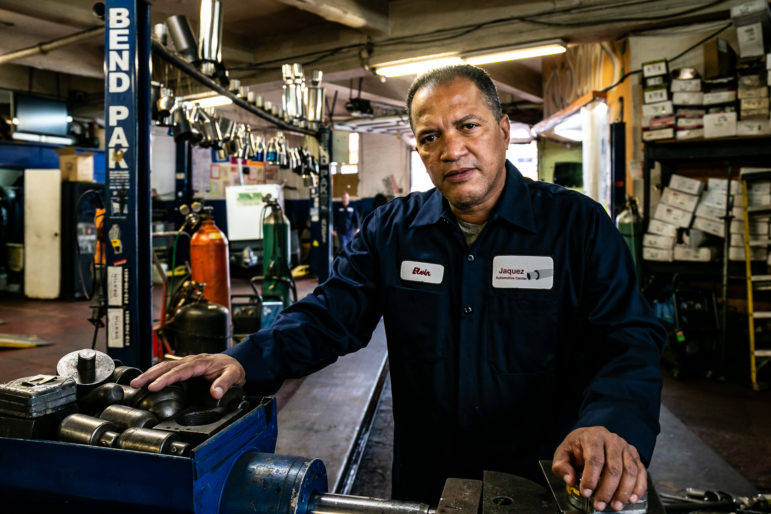
Adi Talwar
Elvin Taveras, owner of Jacquez Automotive Center at 1941 Jerome Ave. in the Bronx. Taveras was told his business needs to vacate the premises by Oct. 31. Earlier this month, the electricity to his workshop was cut off without notice.This is the first article in a new City Limits series, Zoned Out: Examining the Impact of NYC’s Rezonings. Lea la versión en español aquí.
This story has been updated since its original publication.
In a span of just six months, Elvin Taveras went from managing a thriving auto repair business on Jerome Avenue to being under the shadow of eviction from the place he’s worked for more than a decade.
Taveras—who owns both Jacquez Automotive Center at 1941A Jerome Ave. and another, smaller shop in the northeast Bronx—said his problems began in the spring, when, per city property records, his former landlord, Richard Cisternas, sold the building to Manhattan-based Atlantic Development Group for $6.9 million.
A flurry of notices followed: one from Cisternas, Taveras said, informing him of the coming sale. Then, week after week, he said, bundles of certified letters from his new landlord—sometimes a dozen in one day—started showing up at the shop, notifying Taveras that the new ownership planned to terminate his tenancy. Jacquez Automotive needed to be out of the building by Oct. 31, 2021, the notices said in bold, or face eviction.
In recent weeks, the situation has escalated: On Oct. 2, electricity at the shop was cut off without notice, Taveras said. Since then, he’s been running his auto shop—and every piece of equipment in it—using multiple diesel generators. The first one he tried had just enough capacity to turn on the lights; then he found one capable of powering a car-lifting jack. On Oct. 7, he rented a generator capable of supporting all the equipment.
“I can’t stop my business because there is no electricity,” Taveras said.
Close to two weeks before the end of the month, Taveras’ situation is critical, and just one example of the struggles longtime automotive business tenants on Jerome Avenue are facing three years after the city overhauled zoning rules there to allow for residential development.
In 2018, as part of Mayor Bill de Blasio’s housing plan, the city rezoned this two-mile, 90-block stretch of the southwest Bronx avenue, from East 167th to 184th streets, beneath the elevated tracks of the 4 train. Officials said that changing zoning along the corridor from primarily auto-related, commercial, and industrial uses to enable residential development would create thousands of affordable units in the transit-rich, housing-starved neighborhood.
But the expected influx of new housing means some industrial tenants will inevitably have to go. According to the United Auto Merchants Association (UAMA), a nonprofit trade group, between 35 and 40 auto and auto-related businesses on Jerome have already been displaced since the rezoning, and around 150 still operate. Some, like Taveras, stand to lose businesses they have built for years, as their landlords sell or look to redevelop the properties.
Auto shop owners said there are few comparable spaces elsewhere for them to relocate. Despite a months-long search that included the Bronx, Brooklyn, and Queens, as well as parts of Westchester and New Jersey, Taveras says he has not found a suitable or affordable site to move his business to.
When asked about the power being cut, Cisternas, Taveras’ former landlord, didn’t want to elaborate. Attorneys for Atlantic Development Group, the new owner, did not respond to a request for comment.
In a previous conversation, Cisternas told City Limits he’s in favor of the rezoning, arguing that for years he’s noticed a significant decline in quality of life in the area, such as drug abuse, violence, and excessive noise along the stretch.
“The sooner the better,” Cisternas said of the rezoning.
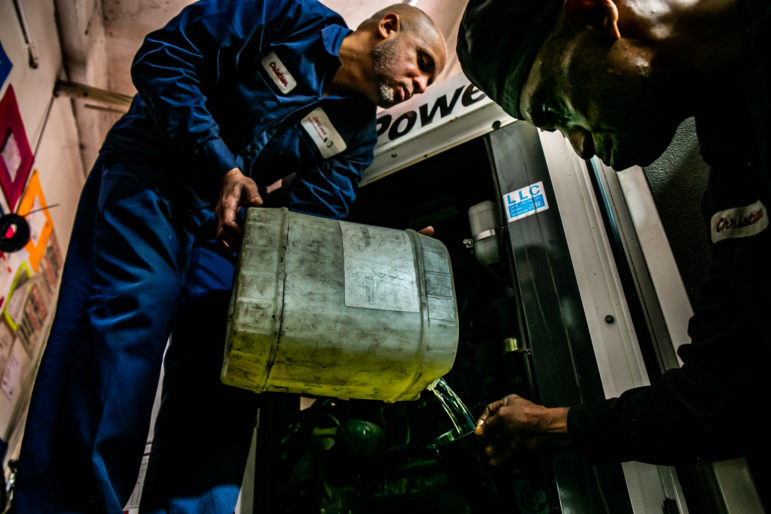
Workers refilling diesel to keep the generator running at Jaquez Automotive Center on Jerome Avenue, after the shop’s electricity was cut. (All photos by Adi Talwar) 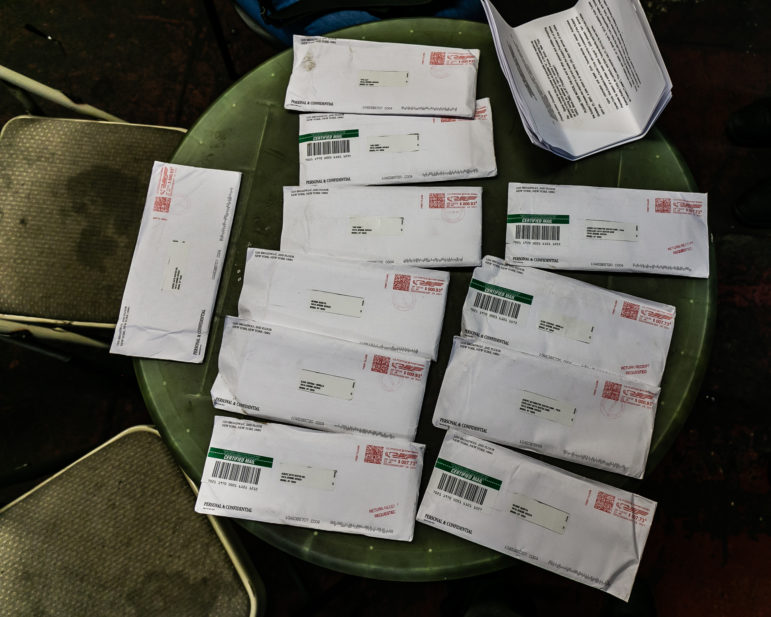
Letters received by auto shop owner Elvin Taveras, notifying him that the new landlord planned to terminate his tenancy. 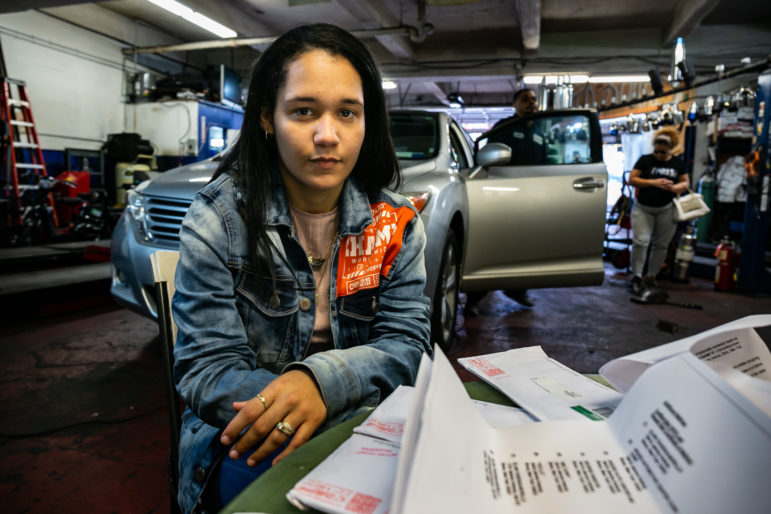
Ashley Polanco, the manager at Jacquez Auto, said she has been searching extensively to find a new location for the Jerome Avenue business. 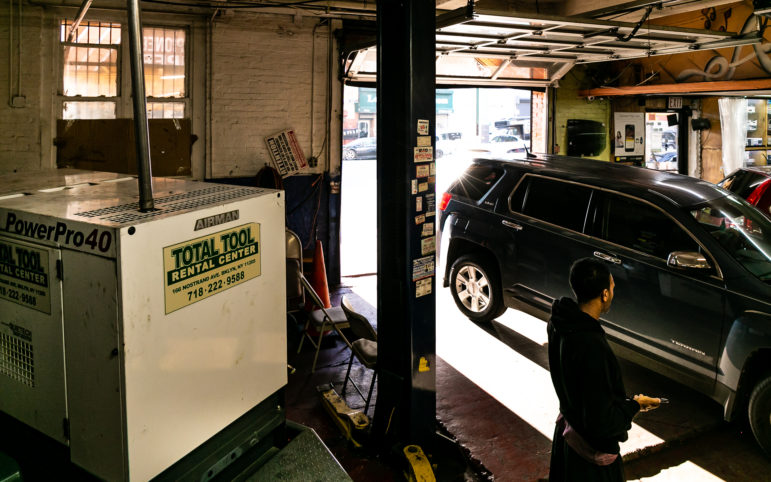
A 39 kVA diesel generator with its exhaust being vented via a pipe to the outdoors seen here left of frame at Jaquez Automotive Center. The generator consumes about 25 gallons of fuel during a work day. 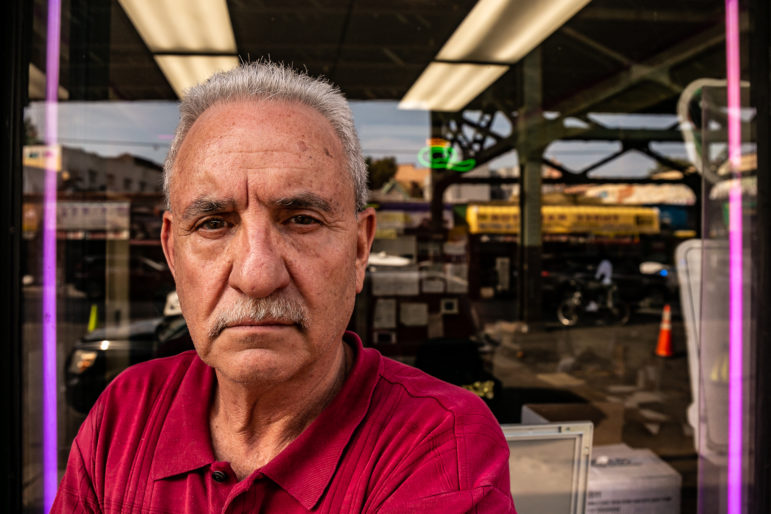
Richard Cisternas, who sold the building where Jaquez is located this past spring for nearly $7 million, told City Limits he’s in favor of the rezoning. 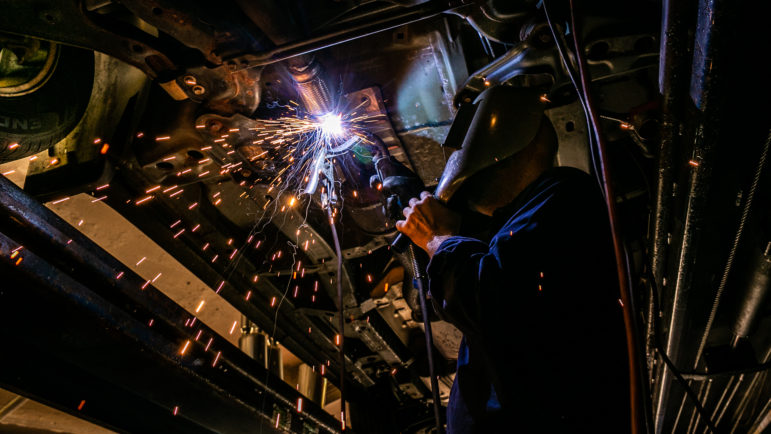
Christian Taveras making repairs to a client’s car at Jacquez Automotive Center on Jerome Avenue. 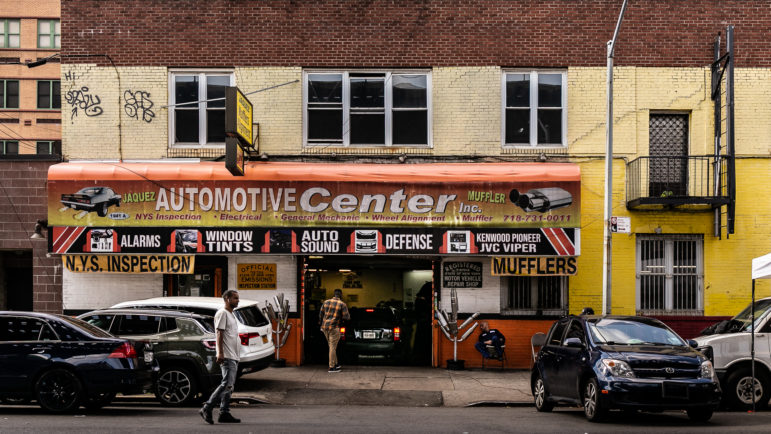
Jacquez Automotive Center located at 1941 Jerome Ave. in the Bronx.
Promised funds, but no applicants
When the city approved the rezoning, officials promised more than $189 million in capital projects and services for the neighborhoods along the rezoned strip, including Highbridge, Mount Eden, and Morris Heights. This package of community benefits included 59 specific commitments, including “catalytic” investments in new schools and parks, improvements to transit and safety, and expanded tenant and business assistance programs, said then-Deputy Mayor Alicia Glen. Since the rezoning passed, the city invested an additional $190 million to construct two new schools in the area and build an annex at nearby P.S. 33, according to a spokesperson for the Department of City Planning.
“New programs will also provide assistance to businesses and their workers who may see change in the coming years,” Glen, who left the de Blasio administration in 2019, wrote in a March 6, 2018 letter to local elected officials that outlined the city’s commitments.
Few businesses and workers stood to be affected more than Jerome Avenue’s auto merchants—the mechanics and technicians who work on engines, tires, brakes, sound systems, mirrors, mufflers, and more, sometimes up to seven days a week. The Jerome Avenue area has one of the largest concentrations of automotive businesses in the city, rivaling the former “Iron Triangle” in Willets Point, Queens, said Pedro Estévez, the president and founder of UAMA.
Since the Jerome rezoning was approved, Estévez has worried that a similar fate would befall The Bronx’s auto sector. Many merchants at Willets Point were ultimately displaced by the Bloomberg administration’s decision to seize their property through eminent domain, part of a plan at the time to build a mall at the site, which ultimately never materialized. Though the city gave a cooperative of close to 50 of the auto body shops there $7 million to relocate to Hunts Point in the Bronx, the group filed for bankruptcy in 2017, saying that moving from Willets Point hurt business.
READ MORE FROM THE CITY LIMITS ARCHIVES: Lessons of Willets Point
Estévez, an auto entrepreneur who worked in the industry for decades before founding UAMA in 2007, estimates that virtually all of the auto repair shops on Jerome are run by business owners who rent privately-owned spaces that were previously zoned for industrial use. Many lack long-term leases, making them especially vulnerable to eviction. The majority of these workers are Latino immigrants, he adds.
The zoning changes have already prompted some local landlords to sell their properties to developers, Estévez told City Limits, ousting longtime commercial tenants. A City Limits review of area property records found that a number of buildings along the corridor have sold for millions since the rezoning. The multi-story building at 2314 Jerome Ave., for example, once home to a moving company, sold last September for more than $9 million.
“When you change the certificate of occupancy to residential, it is no way that those businesses are going to be able to remain there,” he said. “That neighborhood is no longer industrial or commercial, which all those automotive businesses need to exist.”
Anticipating this, city officials created a more than $1.5 million Jerome Avenue Business Grant Program as part of the 2018 rezoning deal, “to help businesses that are directly displaced and need to adapt to changes in the neighborhood.” Businesses facing the threat of displacement, like manufacturing and auto businesses, would be eligible for grants of up to $20,000, intended to help them move to other sites zoned for industrial use.
But today, more than three years after the business assistance program was announced, the city has issued no such grants to local businesses, City Limits found.
The city’s Department of Small Business Services (SBS) says it has yet to receive any applications for the relocation fund, which opened to applicants in September 2019, according to a spokesperson. According to the city’s Points of Agreement for the rezoning, businesses are only eligible for the relocation grants if they are “operating as a use that is non-compliant as a direct result of the rezoning.”
It is not clear how many non-compliant businesses exist in the rezoning area, and city officials did not respond to City Limits’ requests for that number. Though an SBS spokesperson initially said that 59 of 75 local businesses that were initially non-compliant (and thus eligible for the agency’s grant) became compliant with the rezoning, that information from the agency was incorrect. A Department of City Planning spokesperson says those 59 out of 75 businesses instead worked with state’s Department of Environmental Conservation to meet environmental benchmarks, not to become compliant with new zoning regulations.*
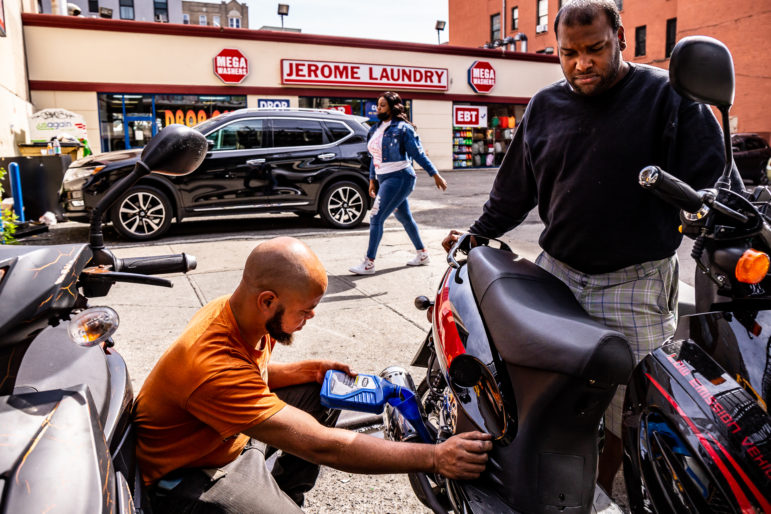
Victor (in orange tee shirt) runs a roadside scooter and motorcycle repair business on Jerome Avenue out of a truck near Tremont Avenue. (All photos by Adi Talwar) 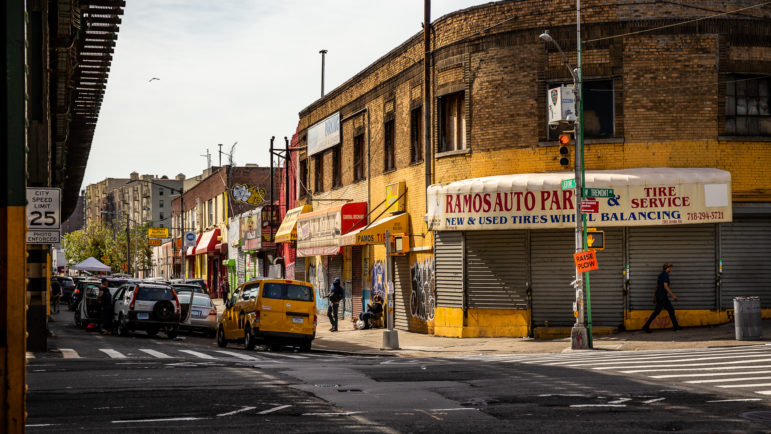
Manhattan-based Atlantic Development Group purchased a large portion of real estate facing Jerome Avenue just south of West Tremont Avenue. 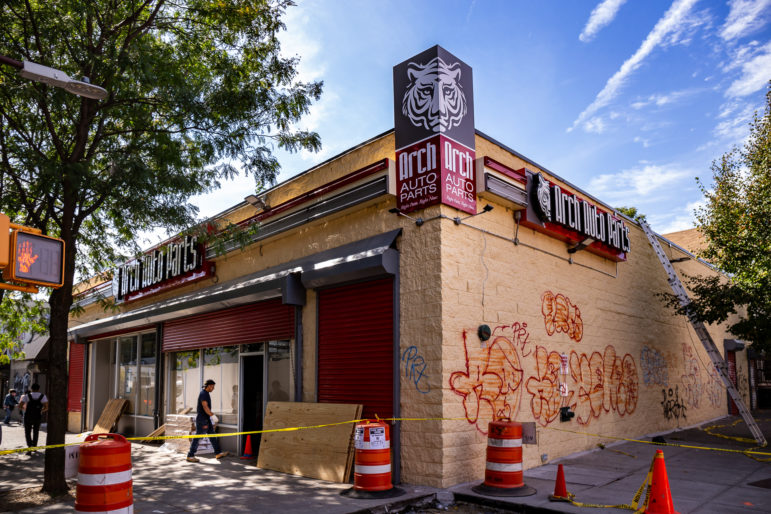
A new automotive business opening at the corner of 184th Street and Jerome Avenue. 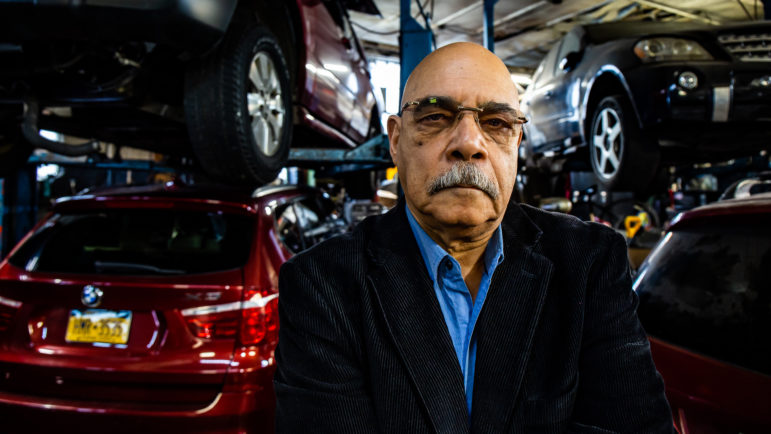
Pedro Estevez, president and founder of the United Auto Merchants Association on Jerome Avenue. 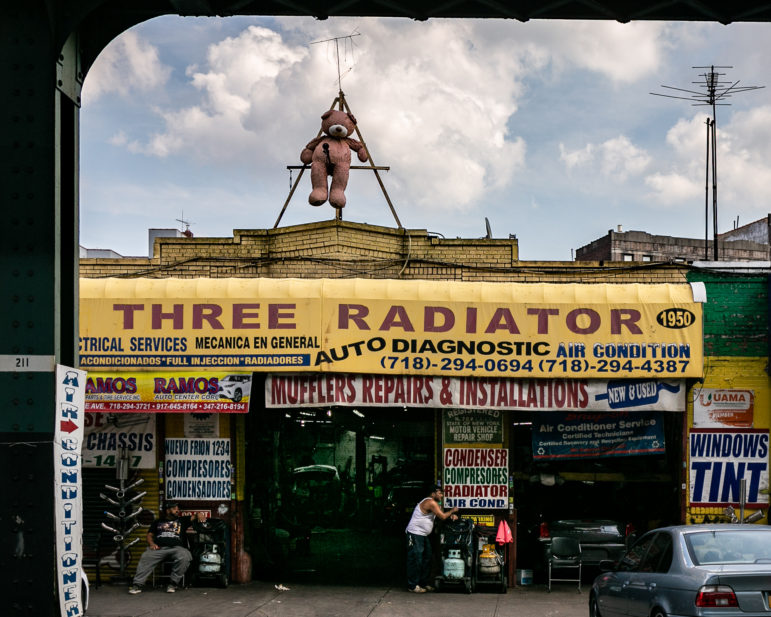
An automotive repair workshop on Jerome Avenue near East Tremont Avenue. 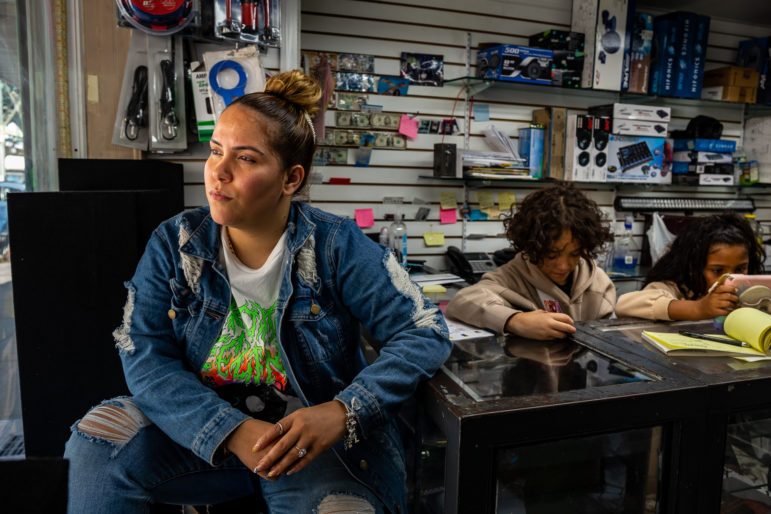
Ana Liriano, manager of Galaxy Auto Center located at 1942 Jerome Ave.
Pressures amidst a pandemic
City Limits recently interviewed more than 25 auto workers on Jerome Avenue, many of whom said the impact of the rezoning on area businesses has been compounded by the COVID-19 crisis. Many are unsure that their operations would be able to weather an eviction.
“If we were not prepared before the pandemic, now we are even less prepared after the pandemic,” said Ana Liriano, one of a slim number of female auto shop managers working on Jerome.
Franklin de la Cruz, now 53, was just 8 years old when he began working as a mechanic in the Dominican Republic. He’s spent 20 years working on cars in the Bronx, and has made his shop at 1271 Jerome Ave. a family enterprise: His son works by his side, repairing cars, and his daughter is in charge of the administrative part of the F&C Body Shop business.
De la Cruz hasn’t had any issues with his landlord. But he also has not signed a lease for more than 10 years, and as businesses around him close and buildings are sold, one question lingers in his mind: What if the owner of his building, drawn to the prospect of the now-permitted residential zoning, decides to sell?
“One is here until they get us out of here,” de la Cruz said, “but then what do I leave my children?”
Dwindling industrial space—and the high cost of moving hundreds of thousands of dollars worth of sensitive machinery, in some cases—has made it exceedingly difficult for many automotive workers to relocate, Estévez said. The SBS grant program maxes out at $20,000.
According to de la Cruz, the mere disassembly and reassembly of an automotive spray booth could cost $100,000—and that’s just one item.
Also complicating matters is the fact that the SBS grants are also only made to reimburse businesses that have already found alternate locations—a bruising task in a rental market where large industrial-use spaces are increasingly hard to find.
Ashley Polanco, a manager at Taveras’ Jerome Avenue shop who’s been tasked with finding the business a new space to move to, says she has looked in The Bronx’s Hunts Point area as well as Queens, Brooklyn, and even Westchester. “Which is, you know, not our area, because it’s really up there,” she said. “We have put in so much effort to find somewhere else to relocate. But it has been hard. It’s been hard.”
U.S. e-commerce activity surged more than 34 percent in 2020, economists at the national real estate services firm CBRE said earlier this year, making large industrial space even more in-demand for big companies who want to increase their warehouse and distribution operations in urban centers like New York City.
Last year’s growth, spurred by the COVID-19 pandemic, is unlikely to be sustainable, said Daniel Tropp, the founder and president of AEBOV, a Brooklyn-based industrial real estate brokerage. But it’s also likely that many who started shopping online will continue to.
“That includes people like my parents, for instance, who never really relied on Amazon and now are constantly getting Amazon deliveries,” he said. “They’re not really going back.”
In the coming years, Tropp anticipates a “really strong demand” for industrial spaces—sites with high ceilings, access to transportation and loading docks, particularly near big cities.
Industrial space in The Bronx is already being snapped up: In the first half of this year, according to an AEBOV analysis of property records, there appeared to be greater demand for industrial properties there than in Brooklyn and Queens. In fact, 43 percent of the $654,806,000 spent on industrial space in the three boroughs between January and June 2021 was spent on Bronx properties, the firm found. Bronx buyers also paid more per square foot.
“The Bronx—and this isn’t something I can really track with metrics, it’s just more anecdotal, what I hear and gather from speaking to a lot of investors—has great access to transportation, it’s booming in its own right in terms of development and population growth, and it’s central,” Tropp said. “For industrial, for something like the distribution and warehouse purpose, tenants can easily access the city and the other boroughs as well as Westchester, even Jersey.”
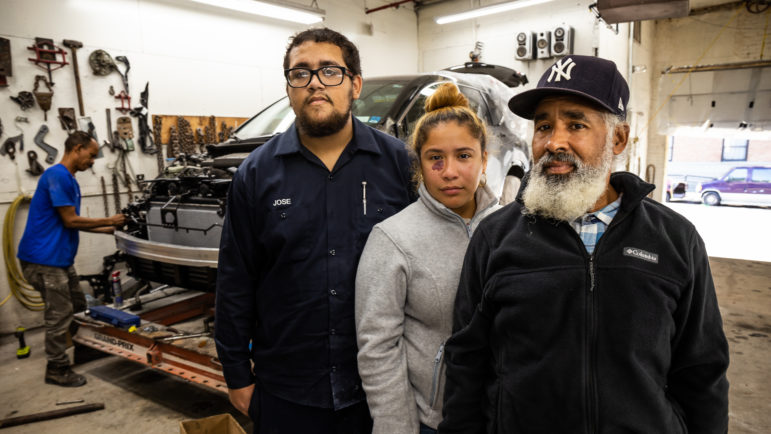
Franklin De La Cruz with his daughter Evelyn, and son Jose, at their family-run business, F and C Body Shop and Auto Repair, located on 169th Street in the Bronx. (All photos by Adi Talwar) 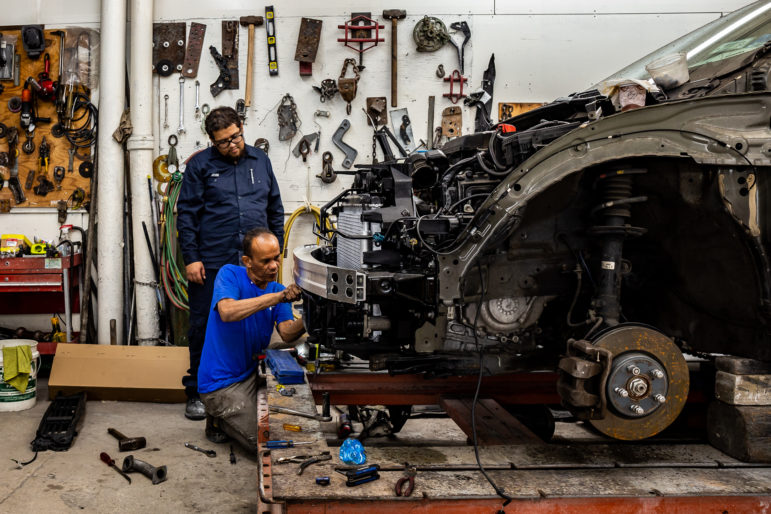
Jose De La Cruz (standing) and Alberto Vasquez working on a car. 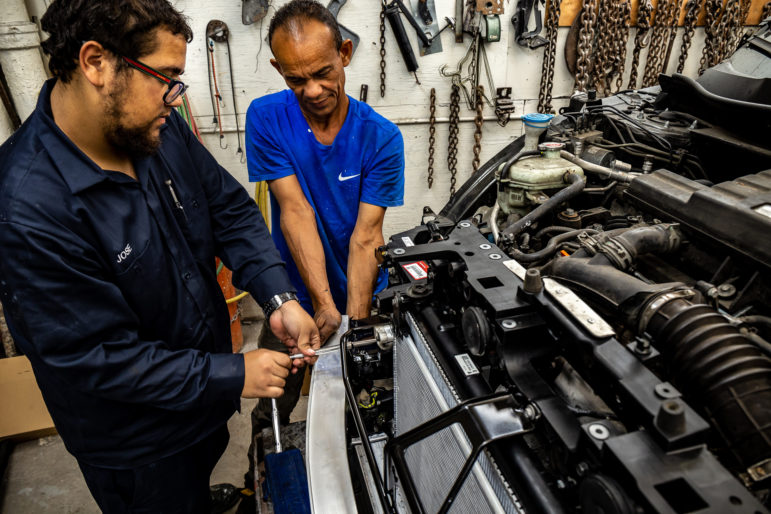
Jose De La Cruz (wrench in hand) and Alberto Vasquez working on a car at F and C Body Shop and Auto Repair, located on 169th Street in the Bronx. 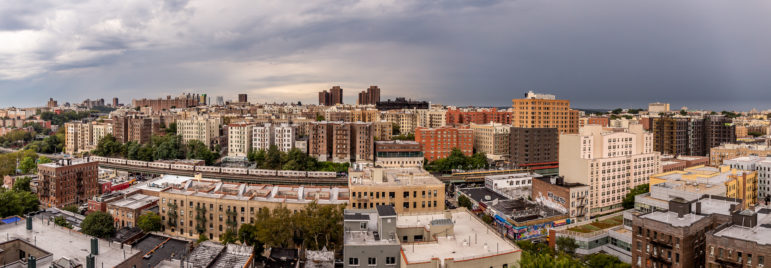
A view of the Jerome Avenue neighborhood in the Bronx with its elevated 4 train track and 176th Street station. 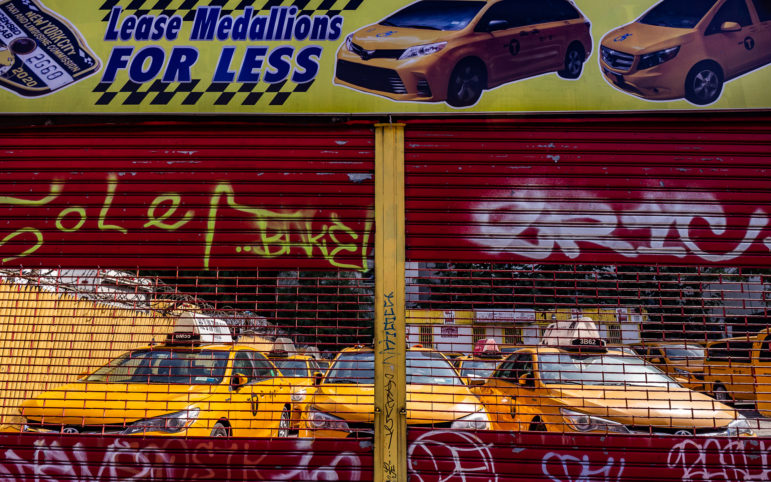
1540 Jerome Ave., Bronx. 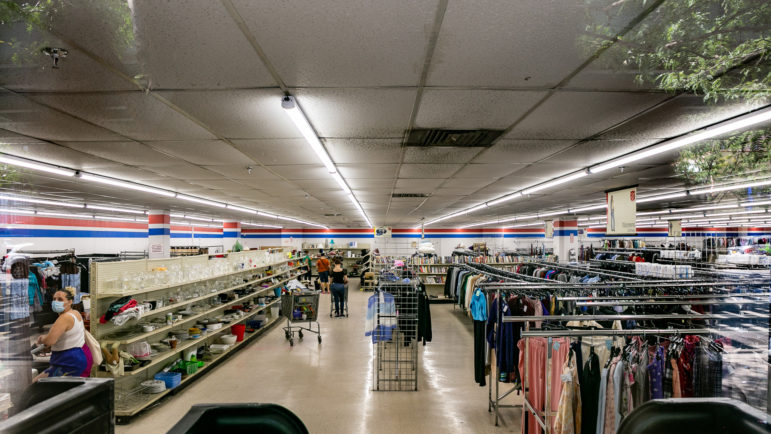
The Salvation Army family store and donation center on Jerome Avenue near 184th Street. 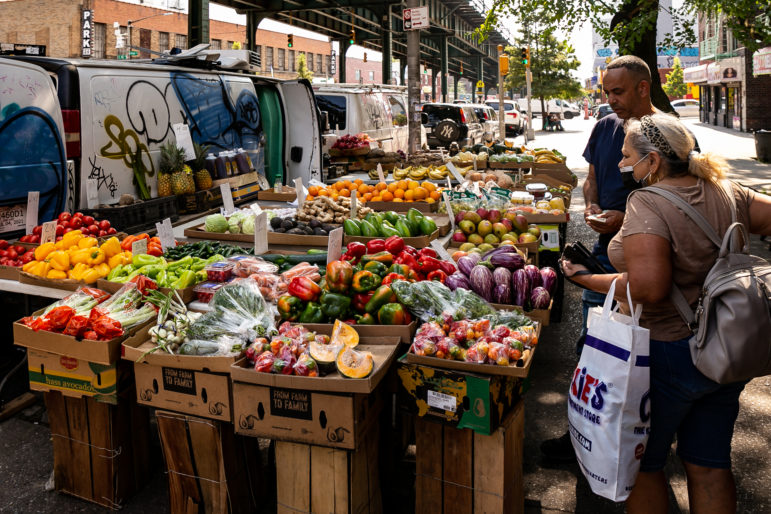
A fruit and vegetable vendor on Jerome Avenue near 182nd Street in the Bronx.
The price of rezoning
The auto merchants are not the only businesses on the Jerome Avenue corridor with uncertain futures. Other shops here—discount stores, small grocery stores, family-owned pharmacies, laundromats, hair salons, bodegas and botanicas—appear vacant, or closed, or have “for rent” signs in their windows. This trend was accelerated by the COVID-19 pandemic, which battered the Bronx. Business owners in the borough, the city’s poorest, also received less in federal payroll protection funds in the earliest, deadliest days of the crisis.
For the business tenants who remain, leases have become elusive, many said. Like Taveras, who has not had a lease since 2015, many owners no longer have yearly contracts on their shops, they told City Limits, making them vulnerable to eviction should landlords decide to sell. Of the approximately 150 auto shops now on Jerome Avenue, according to UAMA’s Estévez, only one auto worker owns his space. Instead, many said they rent increasingly expensive spaces on a month-to-month basis.
Very few, like Draulin Marcelino, who runs a car audio shop, have been able to sign long-term leases. “Mine goes until 2040,” he said, “and if the owner wants to sell, he has already promised to let me know so that I have the opportunity to make him an offer to buy the property.”
He says the last time someone from the city came to talk about the rezoning was in 2019. “Since then, I haven’t seen them again,” he said.
The city most recently held a community visioning workshop in October 2019, and most engagement meetings took place in the years before. The Department of City Planning held dozens of public meetings, community workshops and stakeholder roundtables starting in March 2015, in addition to the formal public review process meetings in late 2017 and early 2018.
While some lament the potential loss of blue-collar jobs and middle-class wages the local auto sector provides, others see the rezoning as an opportunity for much-needed affordable housing. At the time the plan passed, some community members argued in support of the area’s transition from industrial to residential, citing threats to health and safety created by the presence of auto shops near people’s homes.
Since the rezoning, the city’s Department of Housing Preservation and Development (HPD) has financed 1,024 new affordable homes in the rezoned area, a spokesperson told City Limits. More than half of these homes serve low-income households earning less than $53,000 for a family of three, HPD said.
“These new affordable homes in the rezoning area are part of a larger commitment to the neighborhoods around the rezoning area,” the spokesperson said, adding that the agency has financed the building of 4,075 new affordable homes in the community districts that intersect with the rezoned stretch since 2014. More than half, or 2,339 of those, were financed since the rezoning was adopted, according to the agency.
And the zoning changes have not spelled complete doom for all auto merchants. At East 184th Street and Jerome, at the very northernmost edge of the rezoned strip, one auto shop, Arch Auto Parts, is doing something few businesses on the avenue are doing now: opening instead of closing.
Still, three years since the Jerome Avenue deal, some business owners said they were not familiar with the rezoning plan, and while the majority of the managers had heard about it, most mechanics had no idea about the potential changes ahead.
Taveras’ mechanics know about the rezoning and the property sale, and keep working. Every two hours, one of them takes a plastic jug to a nearby gas station for diesel, then rides back on a motorized scooter to refill the generator. On a recent visit to the shop, Cisternas, the building’s former owner—who sold the site for $6.9 million this past spring—was smoking thin cigars and shredding paperwork in front of a business next door, where the electricity still worked. He declined to comment on Taveras’ situation.
Taveras himself, meanwhile, said running the business on a generator has hiked his electricity bill to around $2,640 per month, plus the cost of 25 gallons of diesel per day. As of now, he has no plan to move, and no alternate location for the shop. He relies on the larger Jerome Avenue location to offset some of the expenses at his second, smaller location in the northeast Bronx. If he loses the Jerome Avenue site, Taveras worries his other shop might have to close, too.
“I think it is an abuse,” said Taveras. “This should not be. Now I have to spend money that was not in the budget.”
Taveras is looking to fight the eviction in Bronx civil court, and will present his case on Oct. 29.
*Editor’s note: These lines have been updated since this story was originally published to correct misinformation relayed by city officials. While an SBS spokesperson initially told City Limits that 59 out of 75 businesses in the rezoning area were brought into compliance with the rezoning via work with the state’s DEC, officials later said that DEC program (called Operation Eco-Quality) helps bring businesses into compliance with environmental regulations, not zoning rules.










7 thoughts on “3 Years After Bronx Rezoning, Jerome Avenue Auto Shops Under Pressure”
‘ Anticipating this, city officials created a more than $1.5 million Jerome Avenue Business Grant Program as part of the 2018 rezoning deal.. ‘
A pathetically small amount of money for the task. So small that it’s obvious the deBlasio administration wants these hard working people to disappear. The auto repair shop owners need to get their councilmember(s) involved in this crisis immediately. BTW auto repair shops are not restricted to manufacturing-zoned areas of the city. They are permitted to operate in most commercially-zoned areas of the city. Whoever in the city that is ‘helping’ them relocate should know this. In fact entire zoning categories C8-1 through C8-4 are set aside for ‘automotive and other heavy commercial services’.
C8 zoning info – – https://www1.nyc.gov/site/planning/zoning/districts-tools/c8.page
Just what the neighborhood needs. more people. more congestion. maybe more crime. More crowded subways too. extra exertion on utilities and infrastructure …….. Destroying small businesses and jobs that provide a valuable service to make way for so called affordable housing is a not such a great solution imo.
Wasn’t the Bronx supposed to help attract industry and create jobs? This is not the way to do it.
These jobs will be replaced with ground floor commercial jobs in the newer buildings. And new people require new services so overall commercial activity in the area will be boosted.
Jerome Ave right now is a crime ridden area. Violent crime isn’t only the issue either but people driving on the sidewalk without a care into and out of these garages. Then you have all the pollution. Having more people actually living on Jerome will likely make it safer than it is now, a dead zone late night.
The 4 is getting CBTC and articulated trains which should help out with capacity. The D is getting CBTC on 8th Ave which will also help the overall line. Reduce the Metro North fare and a lot of people would use those stations. More bus lanes are going up nearby on University Ave and Fordham Rd is getting redesigned.
So true. There are single family homes in that corridor. I’m sure they will sell now and the area is going to become more impoverished with only low-income renters, The DeBlasio administration is the greatest cause of devaluation of single family residential property owned by minorities.
Those neighborhoods are a free for all.
Just like the Inwood section that was just re-zoned…painting cars hand car washes car repairs body work parking how ever they want. No parking because dozen of cars are in the streets with no plates or registration and when you see the traffic enforcement he’s in the dealer/autobody hanging out…dyckman to 215 the lawless wild wild west.
BlAsio administration took the money,democrats don’t want nobody to be better in the future.so people have to depend on them VOTE for them
You think this was a “blighted” area before?! 10,000’s of new subsidized residential apartments AND NO JOBS IN THE NEIGHBORHOOD! Good Luck! There is a reason they stopped building Large Scale Government Housing Projects in the 1980’s, this is the same thing, just “privatized”, get all the new buildings are still being built with government money! What 1st floor business do we really expect to see in the 10’s of MILLIONS of potential new retail space? 1 on 3 storefronts are already vacant in the Bronx, and the subsidized tenants they are building for have limited spending power (that is why the are subsidized!). It will be a retail ghost-town. Then the idiot politicians who caused it will push for commercial rent stabilization to fix the problem they created at the expense of the Owners foolish enough to stay involved!
Businesses will suffer due to the Infrastructure upgrades that will be required and the City did NOT even start yet. Where once you had 90 blocks of predominantly 1 and 2 story commercial buildings, each with 2-4 “lightly used” bathrooms, now its 4-6 story apartment buildings with dozens of bathrooms, kitchens and showers. WHERE IS THE WATER GOING?! Jerome already floods constantly, the street sits over a river! increase that usage by 10 fold and it will be another City created disaster.
Then when they do decide to deal with it, after 5 more years of Horrible traffic made worse in the last 3 years, and staying that way for the foreseeable future, because of all the construction- they will then spend another 5-10 years tearing up the street to upgrade the infrastructure (which should have been started as soon as the zoning passed), which will then put all those new businesses out of business!
READY – FIRE -AIM !! Leave it to the City to do it WRONG!